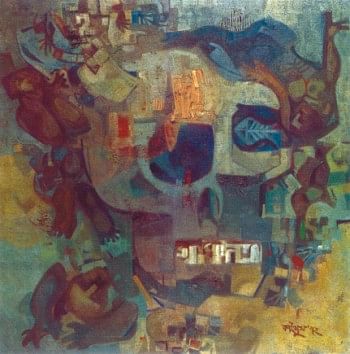| One off
From Independence to Freedom!
Aly Zaker
 |
Qayyum Chowdhury, Independence, oil on canvas, 1972.
Photo: Courtesy |
We became independent Bangladesh on March 26 of 1971, soon after the Pakistan army cracked down on the unarmed people of Bangladesh at the dead of night of the 25th. But we finally became free after our victory against the Pakistan army after a protracted battle for nine months. The day was December 16 the same year. We fought this war to rid us of a colonial rule that was eating away our vitals--all that we lived for. These were something beyond politics or economics. Therefore, many love to call it a war for the freedom of our culture. Need I emphasize that 'culture' here means more than the ordinary definition of the word and includes the language, religion, food, clothing, habitat, rituals et al and, of course, performing arts? In short, we were a subjugated nation that was groaning under malevolent aggression and domination of a power totally alien to us. Pakistan was carved out of the Indian sub-continent on August 14, 1947. And we became East Pakistan. True, that the majority of the people of Bangladesh voted in favour of Pakistan but there were very valid reasons for that. The 'ordinary' people of this part of the world were told by the leaders of the Muslim League, the party that was in the forefront of the Pakistan movement, that if Pakistan became a reality it would see to the end of their toil and distress. On becoming Pakistanis they discovered that not only were they cheated on what was promised to them, they were indeed thrown in to greater chasm of losing their identity. And, culturally, the first blow came on the language. The founder of Pakistan, Muhammad Ali Jinnah proclaimed, “Urdu and only Urdu shall be the state language of Pakistan”. The people of East Pakistan, especially the youth, did not hesitate to protest and in 1952 Bangalis were shot and killed in cold blood on the streets of Dhaka when they were demanding that Bangla be made one of the state languages of Pakistan.
Then, through the subsequent years, we witnessed increasing repression of the people of Bangladesh by the Pakistanis on political, economic and cultural fronts. Finally, the people, en-masse voted for Awami League led by Bangabandhu Sheikh Mujibur Rahman in the general elections to the Parliament of Pakistan. Instead of handing over power peacefully to the party that won the majority seats, they opted for a crackdown. This started a war that culminated in a victory on the 16th of December. Thus the nation of Bangladesh, declared independent on March 26, became a reality on the 16th of December the same year. Hundreds of thousands of lives were lost, hundreds of thousands were dishonoured, properties were burnt down, rails were uprooted, roads and bridges were blown away but we finally became a free nation.
Now, looking back, we know that the war of our liberation truly was a people's war. And that it was not merely for independence either. Firstly, all people belonging to all walks of life, except for a few quislings of the occupation army, participated spontaneously in it. And, secondly, it was a war for total freedom, not just for independence.
The manifestation of the war being that of the people were visible everywhere. When streams of human beings were running away from the city, brutally ousted by the occupation army of Pakistan, they were offered food and water, shelter and succour by the people of the villages surrounding the city. Men, women and children waited eagerly day in and day out by the wayside to give whatever they could to the suffering humanity. This was a rare example of solidarity that is seldom recorded in history. In a matter of days they had to pay very dearly for this. When Pakistan army, done with vanquishing Dhaka, advanced towards the villages around it and further, they destroyed their properties and killed them in cold blood. But the resilient Bangalis stood hand-in-hand to keep doing what they were determined to do or what they thought as their 'little' contribution to the cause of our freedom. Later, as the war of liberation ensued in full fury and the Bangalis engaged themselves effusively in the war, these people worked as active freedom fighters all over, giving food and shelters to them, keeping their arms hidden within their homes and hearths, and even working as courier to convey messages to distant villages. Therefore, it became almost impossible for the occupation army to move from one place to the other. They became mortally scared of the heartland of Bangladesh. When the Indian army moved in to Bangladesh, led by the freedom fighters, they found Bangladesh welcoming them as a true friend and not as a foreign army. When the people are with any advancing force half the battle is won. It is now recognised that each one of these unsung heroes of the heartland of Bangladesh was a freedom fighter and should be equally treated as such with those that had fought the war with arms in hand.
Freedom is verily different from independence. Our war for freedom literally translated in to Bangla, Mukti Juddho (different from Shwadhinata Shangram), is also known as such. We fought for freedom of a nation--freedom of a land mass, freedom of thought, of language, of expression, of art and letters, of all that is retrograde and obsolete. Above all we fought for freedom of identity of a nation cherished in the thoughts of our forefathers for thousands of years. We should look back to that glorious period of our liberation war and think hard how far we have been able to achieve that freedom nearly forty years down the line. Otherwise, most of what we have achieved would seem futile now. And we will have remained indebted to our martyrs forever.
Copyright
(R) thedailystar.net 2010 |
|
